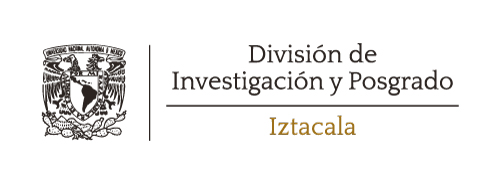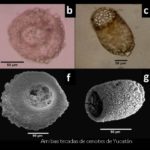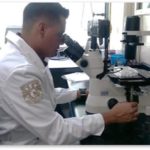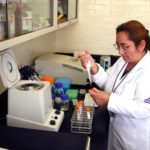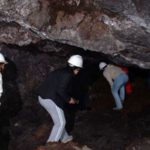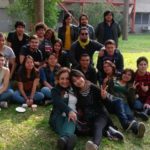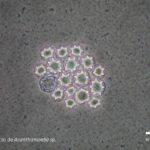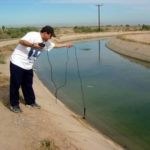
| Location within campus: | Interdisciplinary Research Unit in Health and Education Sciences (UIICSE). Conservation and Improvement of the Environment (CyMA) Second Level. |
| Phone: | 55 56 231296 ext. Laboratorio 39765 y cubículo 39718 |
| Head of Laboratory: | Dra. Elvia Manuela Gallegos Neyra Doctorate in Sciences. Full Professor “A” elvia.gallegos1@gmail.com |
| Research lines per researcher: | Isolation and Identification of Potentially Pathogenic Protozoa (Free-Living Amoebas) in Clinical and Environmental Samples. Diversity of Free-Living Protozoa in Recreational Water, Drinking Water Supplies, and Irrigation. Protozoa Found in Wastewater Treatment Plants. Diversity of Tecamoebid Protozoa in Various Bodies of Water. Diversity of Leeches (Hirudineans) Found in Various Bodies of Water (Recent Research Line). |

Free-living protozoa are organisms with a wide geographical distribution, occupying various ecological niches, primarily in bodies of water and soil. In our laboratory, we study the biology of these organisms and their medical importance due to human invasion of different habitats, which has led to the emergence of pathogens capable of causing diseases in humans. Examples include free-living amoebae (FLA) such as Acanthamoeba spp., Balamuthia sp., Sappinia sp., and one of the most important ones, Naegleria fowleri, which can invade the central nervous system through the nasal route, causing primary amebic meningoencephalitis and leading to death in a very short period of time. Additionally, we are involved in the detection of these microorganisms in various types of water (recreational, drinking, irrigation, and wastewater), not only due to the potential danger they pose to humans, but also for their ecological importance and as indicators of water quality. For over 35 years, we have been studying the diversity of potentially pathogenic free-living protozoa in clinical and environmental samples, and we have contributed to the description of new records in different areas of Mexico.

Sigala-Regalado, I., Lozano-García, S., Escobar-Jaramillo, J., Pérez-Alvarado, L., & Gallegos-Neyra, E. M. (2016). Testate Amoebae (Amebozoa: Arcellinida) in tropical Lakes of Central Mexico. International Journal of Tropical Biology and Conservation, 64 (1), 377-397. ISSN-0034-7744. http://www.revistas.ucr.ac.cr/index.php/rbt/article/view/18004/23034
Gallegos-Neyra, E. M., Lugo-Vázquez, A., Calderón-Vega, A., Sánchez-Rodríguez, M.R. y Mayen-Estrada, R. (2014). Biodiversidad de protistas amébidos de vida libre en México. Revista Mexicana de Biodiversidad,85, S10-S25. ISSN 1870-3453. https://www.redalyc.org/articulo.oa?id=42529679041
Gallegos-Neyra, E. M., Becerra-Cigarroa, J., Figueroa-Méndez, M. G., Fuentes-Zuno, S. A., Hernández-Zamarripa, A. R., Javier-Venegas, D. I., & Villa-Delavequia, G. S. (2018). Amibas de vida libre potencialmente patógenas en playas de Tuxpan y Arrecife Ingeniero, Veracruz. Revista de Zoología, (29), 1-5. https://www.redalyc.org/jatsRepo/498/49855322001/html/index.html
Gallegos-Neyra, E. M., Álvarez-Barrientos, J. L., Mayen-Estrada, R., Vargas-Arzola, J., Mendoza-Romero, M. J., & Corona-Arzola, A. D. (2019). Primer registro de amibas de vida libre en el balneario natural ¨Hierve el Agua¨ en el municipio de San Lorenzo Albarradas, estado de Oaxaca. Revista de Zoologia, (30), 1-11. https://www.redalyc.org/articulo.oa?id=49858451005
Gallegos-Neyra, E. M., Calderón-Gallegos, A., Martínez-Domínguez, V., & García-García, A.P. (2020). Naegleria spp. aislada de canales de riego del Valle de Mexicali, Baja California, México. Revista de Zoologia. Enviado.

| Entry profile of potential thesis students: | We are seeking students who are interested in understanding the biology of pathogenic and free-living protozoa. Prospective candidates should have a strong foundation in the field of biological sciences, as well as the ability to communicate effectively in both Spanish and English for presenting research findings. They should be individuals with professional ethics and the capability to work both independently and as part of a team. |
| Service Social Data: | “Isolation and Identification of Emerging Pathogens in Recreational Waters and Drinking Water Supplies” (2019-12/63-2057). This project aims to develop practical and sensitive technologies for the detection of potentially pathogenic Free-Living Amoebas (FLA) affecting humans. It also involves searching for sources of infection in the environment to establish routine monitoring programs for water quality treatment and compliance with Mexican Official Standards. |
